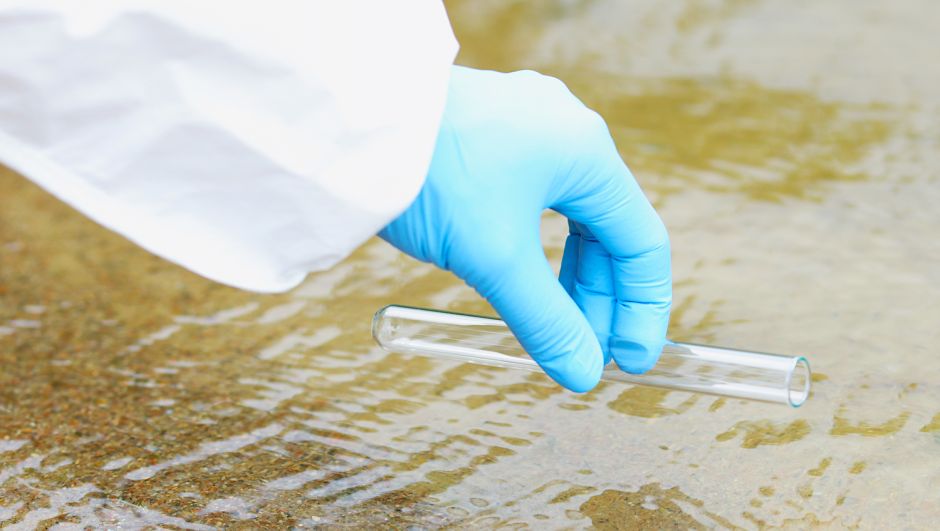Dirty water from ships' exhaust gas treatment is dumped into the sea

Dirty water released from the ships' exhaust gas purification system, the so-called scrubber, accounts for up to nine percent of certain cancer-causing and environmentally harmful substances released into the Baltic Sea. According to researchers at Chalmers, it is significantly more than what has previously been known.
The ships' extensive sulfur emissions prompted the UN's international maritime authority, the IMO, to tighten the rules for emissions as of January 1, 2020. In order to meet the requirements and at the same time continue to run on cheap fuel, many ships have since then installed scrubbers that "wash" the exhaust gases in seawater. This reduces the release of hazardous substances into the atmosphere but leave behind a heavily acidified wastewater that contains a cocktail of carcinogenic substances and toxic heavy metals that are often dumped directly into the sea.
“For many years, we have flagged the fact that scrubbers are a technology that accounts for disproportionately large emissions of dangerous and acidifying substances into the marine environment. Despite this, we have seen a marked increase in the number of scrubber installations, and the reason for this is that it is economically beneficial for the shipowner. Therefore, it is very important that authorities and decision-makers now wake up and start a regulation to reduce shipping's emissions and impact on the marine environment”, says Ida-Maja Hassellöv, a researcher at Chalmers in a press release.
In a new study, which is published in the Marine Pollution Bulletin, researchers from Chalmers can state that more than 200 million cubic meters of environmentally hazardous washing water were released from ships that cleaned their exhaust gases in the Baltic Sea - in just one year. It is significantly more than what has previously been known.
“Our results show that shipping accounts for a significant proportion of the hazardous substances that are released into the Baltic Sea, above all through bottom paints and the release of washing water from open scrubbers. PAHs are highly toxic to both humans and aquatic organisms as they are, among other things, carcinogenic. Worth noting is that the study's data was collected in 2018, and at that time there were approximately 180 ships with scrubbers in the Baltic Sea. Since then, these ships have increased significantly and in 2021 there were almost 600 ships with scrubbers in the Baltic Sea”, says Erik Ytreberg, who led the work on the study.
The new research results have led the Norwegian Maritime and Water Authority and the Swedish Transport Agency to propose a ban on the discharge of so-called scrubber water into the internal waters of the Baltic Sea. If the politicians follow the line of the researchers and the authorities, Sweden will be the first in the Nordic region to introduce such a ban.
“The proposal to ban the discharge of washing water into Swedish internal waters is good, but at the same time it means that only 1–2 percent of the discharges that occur through scrubber water in the Baltic Sea today will be regulated. Sweden could also propose a ban in our territorial waters, which would have meant that approximately 15–17 percent of emissions to the Baltic Sea could have been regulated. But the biggest effect would obviously have been an international ban, where all the countries around the Baltic Sea agree on a joint regulation of the discharge of scrubber water”, says Erik Ytreberg.
-
 NextWave – en podd som ska locka unga
NextWave – en podd som ska locka unga -
 Ny studie: Eldrivna pendelbåtar kan effektivisera Stockholms kollektivtrafik
Ny studie: Eldrivna pendelbåtar kan effektivisera Stockholms kollektivtrafik -
 Sjöfartens utsläpp ökar
Sjöfartens utsläpp ökar -
 Sociala relationer påverkar val av bränsle
Sociala relationer påverkar val av bränsle -
 Sjöfartens omställning kräver ”mjukare” påtryckningar
Sjöfartens omställning kräver ”mjukare” påtryckningar -
 Hon hade avtalad tid med Kapten ynkrygg
Hon hade avtalad tid med Kapten ynkrygg -
 Lighthouse omvärldsanalys 2025 – osäkerhet och tullar präglar sjöfarten
Lighthouse omvärldsanalys 2025 – osäkerhet och tullar präglar sjöfarten -
 Se seminariet Shipping in the Marine Environment
Se seminariet Shipping in the Marine Environment -
 Vad betyder egentligen de 90 procenten?
Vad betyder egentligen de 90 procenten? -
 Hålla där...
Hålla där...

